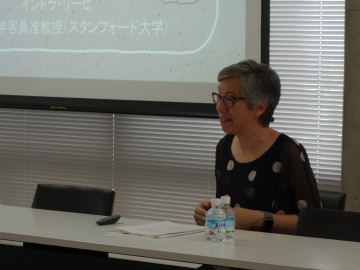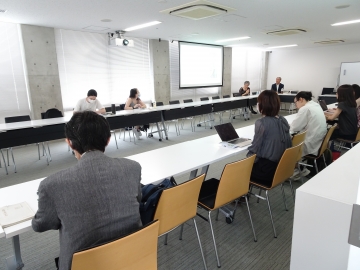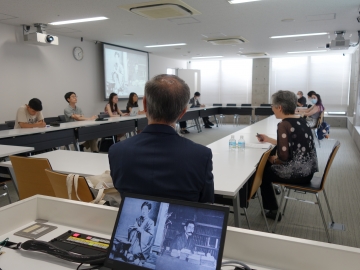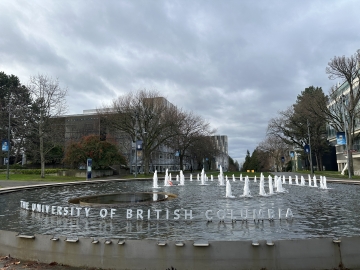On July 7, Dr. Indra Levy, Associate Professor at Stanford University and Visiting Associate Professor at Waseda university, gave a lecture entitled “Laughter and Meiji Literature” in Conference Room 10, Toyama Campus.
Student Report: Bianco Francesca, Graduate student of Global Japanese Literary and Cultural Studies (Global-J) in Graduate School of Letters, Arts and Sciences
Dr. Indra Levy, Associate Professor at Stanford University and Visiting Associate Professor at Waseda University, gave a lecture entitled “Laughter and Meiji Literature” on July 7, 2023. The lecture was held at Conference Room 10, Building 33, Toyama Campus, Waseda University.
Dr. Levy has taught in the East Asian Languages and Cultures Department at Standford University since 2011. She has received several honors and awards for her contribution to the field of Japanese Literary Studies, and the most recent one was the Irene Hirano Inouye Memorial Award at UCLA in 2022. During her career Dr. Levy has made outstanding achievements in the Modern Japanese Literature world and Translation studies. One of her most prominent works in this regard is Translation in Modern Japan (Routledge, 2010), in which she contributed as editor, and that analyses how translation shaped the image of national literature in Japan. Since September 2010, she is the Executive Director of the Inter-University Center for Japanese Language Studies (IUC), a consortium of 15 Universities based in Yokohama.
The lecture addressed the idea of laughter during the Meiji era through the analysis of some literary works written by two of the major writers of that period: Tsubouchi Shōyō and Natsume Sōseki. The lecture started with a brief overview on the concept of laughter and what distance lies between the theory and practice of comedy. Different types of comedy require different methods to employ in order to generate laughter in the readers. Continuing from this, Dr. Levy presented the two authors and their historical context. Using the comedy for adults as framework, she offered some examples on the concept of laughter from three main sources: two essays written by Tsubouchi Shōyō, Naze kōkkei sakusha ha idezaruka (1897) and Ikanaru hito ga mottomo waruku (1897), and some fragments from the masterpiece Wagahai ha neko de aru (1906) written by Natsume Sōseki.
Dr. Levy showed the differences of how these two authors envisioned the concept of laughter and what kind of value it held at their time. According to Shōyō, in a similar way to what the philosopher Thomas Hobbes believed, humor and sadness are two equal sides of the human society to be regarded with the same importance. Shōyō considered the “natural comedy”, a form of humor that was not overly forced by gimmicks and complex schemes, the superior form of comedy. Feeling a distance between the natural comedy and what was common at the time, the critiques on comedy literature were quite harsh. On the other hand, with the publication of Wagahai ha neko de aru, it can be said that Sōseki was able to revitalize the humour in literature using the point of view of a cat to show the ridiculousness of the human world. Following this argument, Dr. Levy traced a connection between the laughter seen in the Meiji period and the nationalist sentiment that was going to be strengthened especially in the following years, supported by Western and Japanese scholarship.
The lecture and the following discussion were directed by Dr. Hirokazu Toeda, professor at the Faculty of Letters, Arts and Sciences of Waseda University. Prof. Toeda summarized the main points of the lecture and, through the comments by other fellow scholars and students that joined the lecture, traced a common path of laughter in the modern Japanese literature with previous and following historical times, ranging also from English literature to French literature.
The questions raised to Prof. Levy were mainly centered around the power of laughter in the other contexts that followed the Meiji period. On top of that, interesting discussions were built on the way in which foreign influences might have had a powerful effect on the writers and, by consequence, on their conceptualization of the laughter.
Every participant, including Hidenori Jinno and Koji Toba, Professors of the Faculty of Letters, Arts and Sciences of Waseda University, joined the discussion underlining parallels with their own field of specialization, comparing them to the standpoint of Shōyō and Sōseki presented during the lecture. Other elements analyzed during the discussion time were the style, the comedic timing and the relationship between the discourse on popular literature and where the comedy literature can be placed.
Event details
- Date and Time: July 7, 2023, 17: 00 – 18:40 (JST)
- Venue: Conference Room 10, 33 Bldg., Toyama Campus, Waseda University
- Lecturer: Dr. Indra Levy
- Language: Japanese (Lecture), English and Japanese (Q &A session)
- Atendee: Students and Faculty











